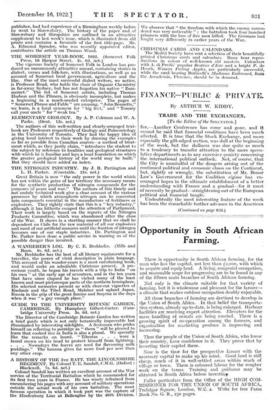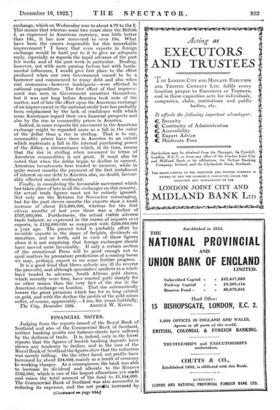FINANCE-PUBLIC & PRIVATE.
By ARTHUR W. KIDDY.
TRADE AND THE EXCHANGES. [To the Editor of the SPECTATOR.] SIR,—Another Conference has come and gone, and it cannot be said that financial conditions have been much affected. It is true that the Stock Exchange, and more especially the gilt-edged section, was dull at the beginning of the week, but the dullness was due quite as much to a tendency to transfer attention to the more specu- lative departments as to any excessive anxiety concerning the international political outlook. Not, of course, that the City is unmindful of the dangers arising out of the continued political and economic chaos on the Continent, but, rightly or wrongly, the substitution of Mr. Bonar Law's Government for the Coalition regime has en- couraged hopes in the ultimate establishment of a better understanding with France and a gradual—for it must of necessity be gradual—straightening out of the European political and financial tangle. Undoubtedly the most interesting feature of the week has been the remarkable further advance in the American (Continued on page 933.) exchange, which on Wednesday rose to about 4.70 to the E. This means that whereas some two years since the British A as expressed in American currency, was little better than 18s., it has now recovered to over 19s. What have been the causes responsible for this remarkable improvement ? I fancy that even experts in foreign exchange would be hard put to it to give an adequate reply, especially as regards the rapid advance of the past few weeks and of the past week in particular. Dealing, however, not with mere passing factors but with funda- mental influences, I. would give first place to the effect produced when our own Government ceased to be a 'borrower and commenced to repay debt and also when real economies—however inadequate—were effected in national expenditure. The first effect of that improve- ment was seen in Government securities themselves, but it was not long before America took note of the matter, and of late the effect upon the American exchange of an improvement in the national credit here has probably been emphasized by the lack of confidence with which some Americans regard their own financial prospects and also by the rise in commodity prices in America. Indeed, in some respects the movement in the American exchange might be regarded more as a fall in the value of the dollar than a rise in sterling. That is to say, commodity prices have risen in America to an extent which represents a fall in the internal purchasing power of the dollar, a circumstance which, in its turn, means that the rise in sterling when measured in terms of American commodities is not great. It must also be noted that when the dollar began to decline in earnest, American investments here tended to increase, while in quite recent months the payment of the first instalment of interest on our debt to America also, no doubt, favour- ably affected market sentiment.
Finally, in considering the favourable movement which has taken place of late in all the exchanges on this country, the actual trade figures must not be entirely ignored. Not only are the 'Returns for November encouraging, but for the past eleven months the exports show a small increase of about £15,000,000, whereas for the first eleven months of last year there was a decline of £707,000,000. Furthermore, the actual visible adverse trade balance, as expressed in the excess of imports over exports, is £152,000,000 as compared with £260,000,000 a year ago. The present total is probably offset by invisible exports in the shape of freights, dividends on securities, and so forth, and in view of these figures alone it is not surprising that foreign exchanges should have moved more favourably. If only a certain section of the sensational Press will be good enough not to spoil matters by premature predictions of a coming boom we may, perhaps, expect to see some further progress. It is a good wind that blows nobody any ill (to reverse the proverb), and although speculative markets as a whole have tended to advance, South African gold shares, which recently were firm, have reacted quite sharply for no other reason than the very fact of the rise in the American exchange on London. That rise automatically lowers the great premium which has for so long existed on gold, and with the decline the profits of the gold mines suffer, of course, appreciably.—I am, Sir, yours faithfully,















































 Previous page
Previous page